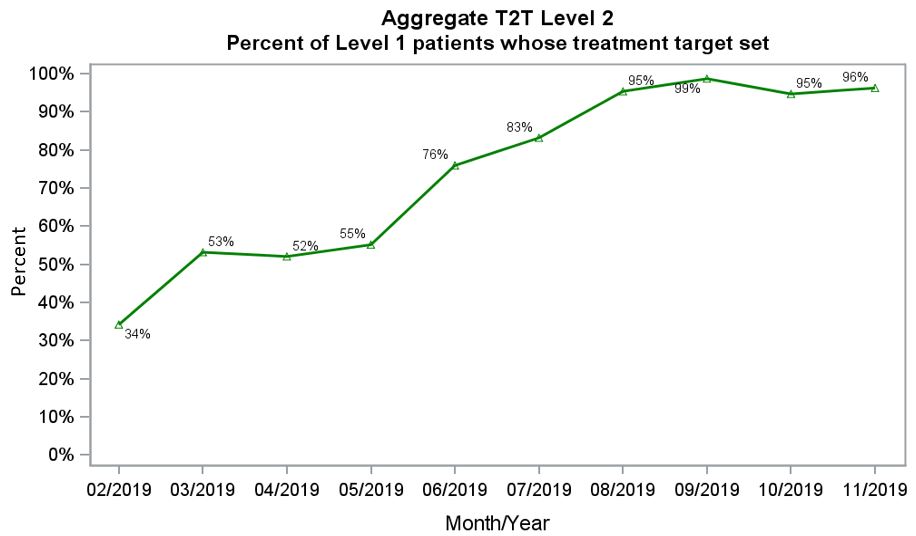Session Information
The 2020 Pediatric Rheumatology Symposium, originally scheduled for April 29 – May 2, was postponed due to COVID-19; therefore, abstracts were not presented as scheduled.
Date: Thursday, April 30, 2020
Title: Plenary Abstracts Session 1
Session Type: Plenary Session I
Session Time: 2:30PM-3:30PM
Background/Purpose: In 2018, an international task force published a recommended Treat to Target (T2T) approach to JIA treatment. This treatment paradigm involves setting a treatment target of disease activity and emphasizes tight disease control while utilizing shared decision making (SDM). Based on the literature and success at a pilot site, centers in the Pediatric Rheumatology Care and Outcomes Improvement Network (PR-COIN) began a collaborative improvement project in February 2019 using quality improvement (QI) methods to test, implement, and disseminate T2T interventions. PR-COIN focused on reliable deployment of three T2T processes: standardized disease activity assessment, setting a treatment target with patient/family, and use of clinical decision support (CDS). Our objective was to implement T2T with high reliability in 80% of PR-COIN centers with initial focus on standardized assessment and target setting.
Methods: PR-COIN co-produced educational materials with patients/families to train providers and staff on T2T implementation and to inform families of this treatment approach. The network designed a staged implementation plan, adapted an evidence and consensus-based treatment algorithm, and created a data submission platform to monitor performance over time via run charts. PR-COIN hosts interactive monthly webinars and provides QI coaching. T2T interventions were being implemented in 3 steps on extended oligoarticular and polyarticular JIA patients: 1) standardize assessment and review of the clinical Juvenile Arthritis Disease Activity Score (cJADAS10), which includes the physician global assessment, active joint count, and patient global assessment, 2) set treatment target with the patient/family utilizing SDM and compare it to current disease activity, and 3) use of CDS. Sites progress to the next step once reliable process implementation (≥80%) is demonstrated in a sample of eligible patients.
Results: As of November 2019, 16 centers are participating in T2T. All centers completed on-site training and use QI methodology, and 14 of 16 centers (87.5%) submitted performance data. Seven sites (43.8%) are currently at high reliability performance for Step 1 and eight sites (50%) for Step 2 (Figure 1). Centers achieving 80% reliability on Steps 1 and 2 are beginning implementation of Step 3. A sample of patient-level data indicates that providers completed Step 1 activities in 185 of 218 encounters (84.9%) in November 2019, which was higher than the data median (52.5%) since project implementation (Figure 2). For Step 2, providers set treatment targets in 178 of 185 encounters (96.2%; Figure 3) and compared the cJADAS10 to the treatment target in 89% of encounters. Use of CDS (Step 3) was performed by three sites on 27 of 218 sampled patients (12%).
Conclusion: PR-COIN co-produced educational materials and its centers are implementing T2T interventions in clinical practice using QI methodology. Performance measurement shows half of sites have effectively integrated Steps 1 and 2 into the process of care and will now focus on Step 3 (CDS), which may require additional support and design for reliable and sustainable implementation.
To cite this abstract in AMA style:
Harris J, Morgan E, Taylor J, Qiu T, Griffin N, Paul A, Bingham C, Bullock D, Ferraro K, Gilbert M, Goh Y, Halyabar O, Jones K, Kohlheim M, Lovell D, Smitherman E, Vago A, Weiss J, Yildirim-Toruner C, Young A, Batthish M, Gottlieb B, Hazen M, Laxer R, Lee T, Mannion M, Olson J, Shishov M, Siddique S, Spencer C, Toth M, Vora S, Burnham J. Implementing Treat to Target Approach in the Care of Juvenile Idiopathic Arthritis Across a Network of Pediatric Rheumatology Centers [abstract]. Arthritis Rheumatol. 2020; 72 (suppl 4). https://acrabstracts.org/abstract/implementing-treat-to-target-approach-in-the-care-of-juvenile-idiopathic-arthritis-across-a-network-of-pediatric-rheumatology-centers/. Accessed .« Back to 2020 Pediatric Rheumatology Symposium
ACR Meeting Abstracts - https://acrabstracts.org/abstract/implementing-treat-to-target-approach-in-the-care-of-juvenile-idiopathic-arthritis-across-a-network-of-pediatric-rheumatology-centers/



